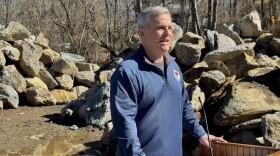The new federal land management plan for the Pisgah and Nantahala National Forests sets goals and guidelines for how the U.S Forest Service should manage, protect and use the land.
The plan was last updated in 1994. It focuses on four overarching themes: connecting people to the land, sustaining healthy ecosystems, providing clean and abundant water, and partnering with others.
Conservation groups argue that the new plan will increase logging by as much as 400% without necessary protections.
"The main concern there is that [the Forest Service is] going to spread that logging out into places that have escaped the harmful effects of logging in the past — places like rare habitats," said Sam Evans, attorney with the Southern Environmental Law Center. “The Forest Service had a once-in-a-generation opportunity to map out a better future for these two incredible forests, but [instead] this is a step backwards."
The Forest Service declined WUNC’s request for an interview. In an emailed statement, spokesperson Alan Abernethy says the plan is designed to improve forest health by creating more diversity.
"The plan will lead to a more diverse forest that has young, mature and old forest characteristics. This diversity makes forests more resilient to insects, disease and climate change," the Forest Service said in a statement.
Some forestry experts agree with the Forest Service's argument.
"Is [logging] harmful? It will change what wildlife lives in the forest if you harvested," said Fred Cubbage, a forestry professor at N.C. State. "You could say it's harmful to wildlife that likes old trees. But really we have so many old trees in western North Carolina [that] on balance, you'd end up with more wildlife of more different species."
But others argue that keeping older trees provides its own benefits, like clean drinking water and sequestering carbon, which helps fight climate change.
"Most people get their drinking water from the National Forests. People want to protect wildlife, the rare and endangered species that depend on these national forests and nowhere else," said Will Harlan, a staff scientist at the Center for Biological Diversity. "Our forests are far more valuable standing than cut down."
Harlan also alleges that the Forest Service ignored public comments and stakeholder feedback. This plan took about 10 years to come together. During that time, there have been dozens of public meetings and thousands of public comments and objections.
"It's been heartbreaking. But I'm still optimistic that the public will prevail, because so many people love this forest," Harlan said. "And there's so much public engagement now that the Forest Service really cannot succeed with this plan without the public's support. And right now, they don't have that public support."
Abernethy wrote that his agency carefully evaluated all public comments and objections.
"The objection review process ensures the revised final plan meets current law, regulation and policy. It also considers changes that improve the analysis and decision," Abernethy wrote in an email to WUNC.
Evans and other advocates will be thinking about their next steps.
"We're not finished with the plan yet. And we'll be considering our options," Evans said. "I'll say, what's not an option is for us to sit back and let them implement this plan for 20 years and make the forest worse off."







